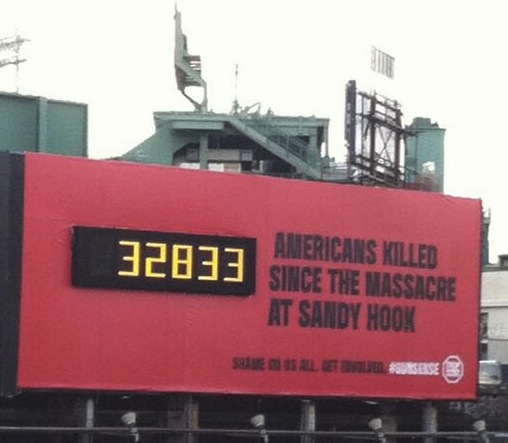Many folks from the greater Boston area are quite familiar with the huge anti-gun-violence billboard that’s been up in Boston for nearly two decades, outside Fenway Park along the Mass Pike. It’s reportedly the largest billboard in America.
Every so often, the Stop Handgun Violence group responsible for it, changes the specific message, though its focus is usually related to gun deaths of children. They have just updated it with a counter showing the number of gun deaths in the United States since the Sandy Hook massacre a year ago. You can read their press release here.

Credit: Anne Mostue of WGBH Boston.
Meanwhile, even today there was another school shooting, just miles from Columbine High School. In a separate incident, a young mother was shot when she tried to take a handgun away from a 23 month old baby, who was playing it with it. Over five hundred children are killed every year in America due to gun accidents in the home and other gunshot incidents.
The Boston Globe published a front page story on Thursday, entitled:
Newtown far from a catalyst for gun control: In a year since school shootings, many states loosen their laws
President Obama […] made it his personal mission: “Are we really prepared to say that we’re powerless in the face of such carnage, that the politics are too hard?”
Much of the politics, in the end, turned against him. Today, it is easier, not harder, to carry a gun in many parts of the nation than it was before the Newtown massacre last Dec. 14.
More than 1,500 bills were filed in state legislatures amid a chorus of grieving voices from shattered families. And while several reliably blue states enacted major reforms, far more states, more than two dozen, passed laws that weakened gun control. Many expanded the number of places where concealed weapons are permitted.
The federal effort, championed by Obama, failed in April in the face of Senate opposition to expanded background checks, a ban on assault weapons, and limits on ammunition magazines. In Colorado, two state senators were recalled by voters for supporting tougher gun restrictions in the wake of horrific killings at a movie theater in Aurora. A third state senator resigned rather than face a recall.
Yes, more states rolled back controls than those who expanded them.
Recall in Rhode Island
Just next door to both Massachusetts and Connecticut, the little town of Exeter Rhode Island has exploded in vitriol as gun advocates campaign to recall four town council members who dared to try to move concealed-carry permitting from the overwhelmed and under-resourced town clerk’s office to the state attorney general’s office, which used to handle it anyway as recently as 2011.
Under Rhode Island law, it’s much easier to get a local permit than a state permit, so many gun owners get theirs through the local authorities who are less free to refuse permits. What’s the distinction?
State law mandates that local authorities “shall” grant the permit to a qualified applicant — but the attorney general “may” issue a permit, giving that office more discretion.
In general, Rhode Island towns and cities do local licensing through their police force, but the town of Exeter is too small to have its own police force. So a few years ago, a town council member who also happens to own a gun store, insisted the town clerk had to start issuing the licenses instead, even though they were not adequately prepared to handle the task.
Shortly thereafter, the other council members decided that they should actually probably hand it off to the state attorney general’s office, which could do more thorough checks on applicants but who also had more authority to deny permits. The (now-former) town councilman who owns a gun store has led a nasty recall election campaign against the four members (out of five) who pragmatically and for safety reasons thought the matter should be referred to professionals (though it would require a state legislative act to codify the exemption and thus hasn’t even taken effect yet).
This is literally the smallest possible measure of gun control possible — restoring the situation to how it was two years ago with a one word distinction in the level of permit availability — and yet the gun advocates are trying to run everyone out of office. (In a particularly bizarre twist, the recall process there stipulates that offices recalled are filled by the losing candidate in the previous election.)
The campaign has been extremely vicious and filled with lots of big cash from the wider gun rights movement, as well as allegations that during the petition phase the pro-gun side told senior citizens the council members were secretly trying to raise their property taxes.
Voters there will head to the polls tomorrow.
 I submitted this letter to the editor of the Boston Globe last week — I don’t think they published it — regarding this story, which has been brewing for quite some time.
I submitted this letter to the editor of the Boston Globe last week — I don’t think they published it — regarding this story, which has been brewing for quite some time.


